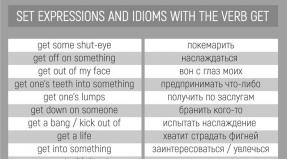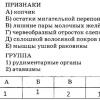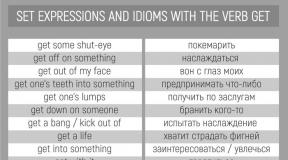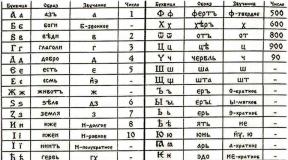Verbs go get have. Get – what is its use in English? Phrasal verb get away
English is truly the language of parasites. The verb get is considered one of the most common verbs in the English language. But not only is it used as a separate verb in various meanings, it is also combined with many prepositions to form phrasal verbs, for example “get up”. So it turns out that there is one verb, but many meanings. Actually, we’ll talk about this lazy verb today. Let's get started!
Tenses of the verb get
Simple Tenses
Present: I, YOU, WE, THEY + GET // IT, HE, SHE + GETS
Past: I, YOU, IT, HE, SHE, WE, THEY + GOT
Future: I, YOU, IT, HE, SHE, WE, THEY + WILL + GET
Continuous Tenses
Present: I AM // IT, HE, SHE IS // YOU, WE, THEY ARE + GETTING
Past: I, IT, HE, SHE WAS // YOU, WE, THEY WERE + GETTING
Future: I, YOU, IT, HE, SHE, WE, THEY + WILL BE + GETTING
Perfect Tenses
Present: I, YOU, WE, THEY HAVE // IT, HE, SHE HAS + GOT (GOTTEN)
Past: I, YOU, IT, HE, SHE, WE, THEY HAD + GOT (GOTTEN)
Future: I, YOU, IT, HE, SHE, WE, THEY + WILL + HAVE GOT (GOTTEN)
Perfect Continuous Tenses
Present: I, YOU, WE, THEY HAVE // IT, HE, SHE HAS + BEEN GETTING
Past: I, YOU, IT, HE, SHE, WE, THEY HAD + BEEN GETTING
Future: I, YOU, IT, HE, SHE, WE, THEY + WILL + HAVE BEEN GETTING
Verb have got & has got
« Get- get, receive" is also used in the meaning " have - have and possess» in the temporary form Present Perfect. It indicates that someone has some object, a friend or relative, etc. Below are the forms of the verb “have got”:
I have got a new smartphone.- I have a new smartphone.
Jennifer has got a charming smile.- Jennifer has a charming smile.
Have your parents got an apartment in LA?- Do your parents have an apartment in LA?
Although "have got" is also used in American English, it is most often used in British English. It is important to keep in mind that the irregular verb "get" has 3 forms. For a Canadian and an American: “get - got - gotten"; for the British and everyone else: "get - got - got" However, despite this, in America “got” is used specifically in “have got”, in other cases the past participle “gotten” is used.
Phrasal verb with get
To get +
- Down- 1) go down, go down, bend down; 2) to depress, to worsen.
Jessica has been suffering from depression for a week already, stop getting her down even more. - Jessica has been suffering from depression for a week now, stop making her even more depressed.
- Over- 1) overcome, heal, recover; 2) redirect, cross; 3) outsmart.
That"s not a piece of cake to get over it, Tom! - It's not so easy to recover from something like this, Tom!
- At- 1) reach, get there; 2) call; 3) offer, try to say.
We can't understand what they are getting at. - We don't understand what they are trying to say.
- On- 1) live; 2) take (transport); 3) continue, remind someone to do something.
My elder sister gets on the train at 10 a.m. every Monday. - My older sister takes the train every Monday at 10 am.
- Across- 1) get over; 2) communicate; 3) explain, explain
Alice is fluent in Albanian, however she doesn't get across. - Alice speaks Albanian fluently, however, she does not express herself clearly.
- Down to- 1) achieve; 2) seriously sit down to some work; 3) start doing what you avoided or could not due to circumstances.
All colleagues have to get down to the important project. - All colleagues are forced to sit down to an important project.
- Out of- 1) avoid; 2) get out, leave, get out of (transport); 3) find out, find out, become known (secret/mystery).
Get out of there right now, Chris! - Get out of there now, Chris!
- Ahead- to succeed, to advance.
Do you know any hacks on how to get ahead in graphic design? - Do you know any useful tips to succeed in graphic design?
- Away- 1) to get out, leave someone/something; 2) hide from the one who is pursuing you; 3) relax.
Hey, get away from me! You are freaking me out. - Hey, get away from me! You're scaring me.
- On with/along- to get along, get along, have friendly/warm relations with someone.
Unfortunately, we cannot get along with our neighbors. - Unfortunately, we cannot get along with our neighbors.
- Around- 1) become famous, spread; 2) find a way to avoid a difficult or unpleasant situation so as not to have to deal with it.
My wife was born in a tiny town, where gossips got around really fast. - My wife was born in a tiny town where rumors spread very quickly.
- Funky- have fun, indulge in fun.
Somebody turn that boombox on, cuz it's time to get funky! - Somebody turn on that boombox, because it's time to have some fun!
- Up- get up, rise; dress up, comb, make up, beautify.
Shane is planning to get up early and bump some walkers. -Shane plans to get up early and shoot some walkers.
Expressions with get + adjective/participle
Translation of the verb "GET" in English idioms

To get +
- Away with murder- get away with it and remain unpunished.
I'm able to break your heart and get away with murder. - I can break your heart and get away with it.
- One's drift- feel/understand what the interlocutor is driving/leading towards; take the hint.
We can't get your drift.- We don't understand what you're getting at.
- A load of one's feet- sit down and relax.
Don't worry, just get a load off your feet. - Don't worry, just sit down and relax.
- Real- come down from heaven to earth, look at things soberly.
It's time to get real, my artless friend. - Time to come down to earth, my simple-minded friend.
- The nod- to be chosen, to be among the chosen ones, to get the green light.
William got the nod for the position. - William was appointed to the position.
- On someone's case- to be angry, to be dissatisfied.
Parents aren't able to get on their children's case. - Parents are not able to be angry with their children.
- A toehold- to catch on, gain a foothold, consolidate your position in the organization.
As soon as Nicky gets a toehold in the London firm, he will feel much better. - As soon as Nicky gets a foothold in the London firm, she will feel much better.
- The lead out- live up, move, get involved in work; come into effect
Peter, it's better to get the lead out! - Peter, you better move!
- Someone's goat- pester, deliberately irritate.
Adam is always getting my goat! - Adam constantly pisses me off!
- One's nose out of joint- to be offended.
Now don't get your nose out of joint, honey . He didn't mean it. - Dear, don't be offended. He didn't mean it.
- One's act together- concentrate, get ready, prepare well, collect your thoughts, get your affairs in order.
If I were Helen I would get my act together and go to Hong Kong. - If I were Helen, I would pull myself together and go to Hong Kong.
- In on the act- contribute, be involved, join.
Are you going to get in on the act and launch a new project? - Are you planning to join and launch the project?
- The message/picture- understand what was meant; understand for yourself the meaning of what was said; understand the meaning of what they were trying to convey; figure out what's what.
I don"t have a great sense of humor, so I didn"t get the picture.- I don’t have a great sense of humor, so I didn’t understand what was happening.
- Face- gain respect.
It takes a long time to get face. - It takes a long time to gain respect.
- The goods on someone- disclose incriminating information.
John got the goods on her wife and they decided to get divorced. - John caught his wife cheating, so they decided to get a divorce.
- It- understand, discern.
Nah, I don't get it, dude. - No, I’m just not catching up, dude.
Translation of the verb “GET” in phrases
A phrasal verb is a special type of verb that is formed by adding to a simple verb pretext (in,on etc.) or adverbs (down, up etc.). As a result of this, the original meaning of the simple verb is lost.
Today we will look at the most “many-faced” and popular in English - the verb to get.
In English, phrasal verbs allow one verb to take on literally dozens of meanings depending on what you add to it. They can take the same aspectual and tense forms as ordinary verbs.  phrasal verbs Despite the fact that phrasal verbs in the English language, as a rule, are used more in colloquial speech than in business communication, the need to know it has not become less. In spoken English, these verb constructions have gained immense popularity. Being a kind of originality of the English language, they will help you add “naturalness” to your speech. By using these forms, you can avoid some of the dryness that is typical of those who learn a language from textbooks. We also often learn individual words, which we then translate “word for word,” thereby making the language unnatural. Today, by learning some of the "root" constructions of the language, you will become one step closer to normal English speech.
phrasal verbs Despite the fact that phrasal verbs in the English language, as a rule, are used more in colloquial speech than in business communication, the need to know it has not become less. In spoken English, these verb constructions have gained immense popularity. Being a kind of originality of the English language, they will help you add “naturalness” to your speech. By using these forms, you can avoid some of the dryness that is typical of those who learn a language from textbooks. We also often learn individual words, which we then translate “word for word,” thereby making the language unnatural. Today, by learning some of the "root" constructions of the language, you will become one step closer to normal English speech.
Verb forms to get in English sentences
It was no coincidence that I named the verb to get“many-faced”: the fact is that a huge number of prepositions and adverbs come into contact with a given verb, radically changing their semantic characteristics. However, it can also show its diversity, taking the form of not only a phrasal, but also a simple verb.  In English, one word can have many meanings, especially if it is a verb. And even more so if this verb is GET
In English, one word can have many meanings, especially if it is a verb. And even more so if this verb is GET
Simple verb to get
Let's consider all the meanings that a simple form of a verb can take to get using example sentences.
12 meanings of the simple verb to get:
- Receive
I got this work, because I have the experience. — I got this job because I have experience - Buy
He gets the black clothes, because he likes black color. — He buys black clothes because black is his favorite color. - Become (sentences like: “It’s dawning” / “It’s getting dark” require this verb)
It is getting dark. — It’s getting dark. (Getting darker) - Bring something to someone
I will get you the cup of tea. - I'll bring you a cup of tea - Complete
I can get this work by evening. — I can finish this work by evening - to force someone, to persuade someone
I will get him to go with us. - I'll persuade him to come with us. - Transfer
I want to get table in the other room. — I want to move the table to another room - get there, arrive
It take me 10 minutes to get to the railway station. — It takes me 10 minutes to get to the train station - Earn
I got USD 12,000 this year. — I earned 12,000 this year - place, place
Mary cannot get all the books in her bag. — Mary can't fit all the books in her bag - Understand
I didn't get the main idea of the story. — I didn’t understand the main idea of the story - Get there using any transport, find transport (catch)
Nick got a taxi. — Nick hailed a taxi.
I get there by boat. — I get there by boat
Forms of the phrasal verb get
Even more “spectacular” versatility is manifested by this verb when it takes on various forms of a phrasal verb. The phrasal verb get has become one of the most popular verbs in the English language. When studying its meanings, do not forget to pay attention to the sentences, since entire forms are better remembered than words taken individually! 
 Forms of the phrasal verb get Get up —
Forms of the phrasal verb get Get up —
- get up
- wake someone up
- intensify (about natural disasters, about feelings, about emotions)
- dress up, put on
- Kate gets up at 9 o'clock. — Kate gets up at 9 am.
- Get him up, we are late. - Wake him up, we're late.
- Fire got up and they had to carry water faster. “The fire was getting worse and they had to carry water faster.
- “Nick, get yourself up this blue shirt,” said his wife. “Nick, put on this blue shirt,” said the wife.
Get along (with somebody)- Get along with)
- Amanda gets along with her boss. — Amanda gets along with her boss
Get along-
- hold out, get by (without something)
- succeed
- get along
- Ann got along without water two days. — Ann lasted two days without water
- Tom got along with his new article. — Tom finished his article
- Nick gets along with his father-in-law. — Nick gets along with his stepfather
Get around- visit, bring to visit
- Get around your girl-friend. — Bring your friend to visit
Get away- to escape, to avoid
- They get away from FBR. — They're running from the FBI
Get down- go down
- I should get down, he is waiting for me. - I have to go down, he's waiting for me
Get back- return, return
- We got back your money. - We returned your money
Get in —
- Win the elections
- Plant (in the soil)
- Gather (tax, harvest)
- Insert (words)
- Enter (college, university, etc.)
- Be sure, you will get in at the election. - Be sure that you will win the elections.
- I got in the potatoes. — I planted potatoes.
- I will get in the apples and pears. — I'll pick apples and pears.
- I want to get some words in. — I want to insert a few words.
Get off —
- depart, depart
- Start off
- Clean
- Save yourself, avoid punishment
- Getting out of transport
- We ought to be getting off. - We have to go
- She got off her work successfully. — She started her work successfully
- I can get this stain off my dress. — I can remove this stain from my dress
(Note the example above. There are cases where an object can be placed between a verb and an adverb/preposition. Such sentences have what is called a “separable” verb.)
- Tom got off thanks to you. - Tom escaped punishment thanks to you
- Lise will get off at the 3rd station. — Liz will get off at the third stop
Get on —
- Get on (in transport)
- Get started...
- You'll get on the bus tomorrow. - Tomorrow you will take the bus
- Drear children, get on to your test. — Dear children, start the test.
Get out —
- leave, get out, leave
- pull out, take out
- “Get out, Mike!”, the girl-friend shouted. - “Get out, Mike!” - his girlfriend shouted
- “Get her out, please,” asked Kate. - “Pull her out, please.” - Kate asked
Get over —
- Coping, overcoming difficulties
- Go, move
- Finish
- She'll get over it. - She can handle it
- I think you should get over there. - I think you should move there
- Mary will get over with her project very soon. — Very soon Mary will finish her project
Get through —
- Pass the exam
- Deal with something/someone
- Many students didn’t get through - Many students did not pass the exam
- He'll get through with this impolite boy! - He will deal with this impolite guy!
Reinforcement exercise on the use of the verb to get
To consolidate, I suggest downloading and completing the following exercise: in the sentences, instead of spaces, insert the word necessary in meaning. Below you will find answers to all the suggestions that will help you find out whether you did everything correctly.
Has the following forms: get - got - got ten US (got UK ).
Basic meanings of the verb Get
obtain
to obtain or buy something
acquire, buy
I need to get some bread on the way home.
I need to buy some bread on the way home.
I"ll try to get you a ticket.
I'll try to get you a ticket.
bring
to go somewhere and bring back someone or something
pick up, take out and bring
Wait here while I get the car.
Wait here while I pick up the car.
receive
to receive something or be given something
receive
Did you get anything nice for your birthday?
Did you receive anything good for your birthday?
Guy still hasn't got my email yet.
The guy still hasn't received my letter yet.
understand
to understand something
understand
He never gets any of my jokes.
He never understands any of my jokes.
arrive
to arrive somewhere (get here /there /to the bank, etc)
come here/there/to the bank, etc.
What time do you normally get home from work?
What time do you usually come home from work?
trip
to trip somewhere on a bus/train, etc (get a bus/train , etc)
travel by bus/train, etc.
Maybe we should get a taxi home.
Maybe we should take a taxi home.
become
get + adjective
become, pass into another state
get tired - get tired (becomes tired)
I can help you if you get tired.
I can help you if you are tired.
get older - grow older (becomes older)
He calmed down as he got older.
He calmed down as he got older.
get better - improve (gets better)
They"ll get better with practice.
They will get better with practice.
get dressed - get dressed (becomes dressed)
Go and get dressed!
Go and get dressed (get dressed)!
to become sick or develop an illness - becomes sick
I feel like I"m getting a cold.
I feel like I'm getting a cold.
Phrasal verbs formed with the verb Get
get across
(separable)
to make smth. understood, communicate understandably
make clear, convey (to the listener), clearly state, convincingly explain, clarify
Gary couldn't get his message across in Japanese. Finally he got the message across in English.
Gary couldn't get his message in Japanese. Finally he received a message in English.
This is the message that we want to get across to the public.
This is the message we want to convey to the public.
get ahead
to achieve success, to be successful in the work that you do
achieve success, succeed
After several slow business years, our company finally got ahead of the competition.
After several years of slow business, our company is finally ahead of the competition.
It's tough for any woman who wants to get ahead in politics.
This is difficult for any woman who wants to advance in politics.
get along
to have a friendly relationship with
to have friendly relations with..., to get along, to be on good terms, to get along
Do you get along with your family?
Do you get along with your family?
I don't really get along with my sister's husband.
I really didn't get along very well with my sister's husband.
get around
to move from place to place
be on the wing
Walter gets around town on his bicycle.
Walter rides around the city on his bike.
to avoid having to do smth.
The kids tried to get around doing the dishes, but they weren’t successful.
get around to
to finally do something, to do smth. eventually
finally do something
I’ll get around to doing the laundry soon, but I’m busy right now.
I'll finally do the laundry soon, but right now I'm busy.
get at
to try to prove or make clear
try to prove or clarify something
I couldn’t understand what Gary was getting at. He didn't make any sense.
I couldn't understand what Gary was getting at. He was doing some nonsense.
get away
to leave or escape from a place or person, often when it is difficult to do this
hide, run away, leave, escape, avoid
Walter tried to get away from the office, but he had too much work to do.
Walter tried to escape from the office, but he had too much work to do.
We walked to the next beach to get away from the crowds.
We walked to the next beach to get away from the crowds.
to go somewhere to have a holiday, especially because you need to rest
go on vacation
We decided to go up to Scotland to get away from it all (= have a relaxing holiday).
We decided to go to Scotland to get away from it all (= have a relaxing holiday).
get away with
to escape punishment, to avoid criticism
avoid punishment or criticism
Edgar got away with stealing that money. He should have gone to jail!
Edgar got away with stealing that money. He should have gone to jail!
get back
to return to a place after you have been somewhere else
return
What time will you get back home tonight?
What time will you return home this evening?
By the time we got back to the hotel, Lydia had already left.
By the time we got back to the hotel, Lydia had already left.
get by
to survive, financially, in a difficult situation
to cope financially in a difficult situation, to survive
After the fire, the family had to get by without a house.
After a fire, a family must survive without a home.
I don't know how he gets by on so little money.
I don't know how he survives on such little money.
get even with
to get revenge, seek revenge, repay in kind
to settle scores, to take revenge, to get even with someone
When Terry told a lie about me, I got even with him.
When Terry lied about me, I got even with him.
get in
to enter
enter, get in, penetrate
I lost my keys and so I couldn’t get in the house.
I lost my keys and therefore I could not get into the house.
They must have got in through the bathroom window.
They must have entered through the bathroom window.
to enter a small, closed vehicle
enter a small, closed vehicle
Sara got in her car and drove away.
Sarah got into her car and drove away.
to arrive
arrive
What time will your flight get in tonight?
What time will your flight arrive this evening?
Our flight"s getting in later than expected.
Our flight will arrive later than expected.
be chosen
pass (in elections), enter (educational institution)
He wanted to go to Oxford University but he didn't get in.
He wanted to go to Oxford University, but he was not accepted.
get into
to become strongly involved with or deeply interested in
to be highly involved or interested in something
I’m sorry, I just can’t get into the game right now. I'm thinking about work.
I'm sorry, I just can't get into the game right now. I'm thinking about work.
get off
to dismount
get off (horse, bicycle)
Charles got off the horse, then walked him to the barn.
Charles dismounted his horse, then led him to the barn.
to be excused from work, class, or other regularly scheduled activities
be released from work, classes
Pam got off doing homework because she had already finished her lessons.
Pam left to do her homework because she had already finished her homework.
to finish one's workday
end the working day
I get off at 5:30. Let's meet for dinner.
I finish at 5:30. Let's meet for dinner.
to receive a lesser punishment than what might be expected
get less punishment than you deserve
Edgar got off easy after he stole that money. He should have gone to jail!
Edgar got off easy after he stole that money. He should have gone to jail!
to leave a large, closed vehicle
leave a large vehicle,
Martin will get off the bus in Los Angeles.
Martin will get off the bus in Los Angeles.
get on
to enter a large, closed vehicle
enter a large vehicle
Quick! Get on the train, it's about to leave.
Hurry up! Get on the train, it's about to leave.
to mount
climb on (horse, bicycle)
Let's go. Get on your bicycle, it’s time to leave.
Let's go to. Get on your bike, it's time to leave.
to upset, to make angry
upset, anger
That rap “music” is really getting on my nerves!
This rap "music" is really getting on my nerves!
get out of
to leave a small, closed vehicle
leave a small, closed vehicle
Get out of the taxi now because we’re here!
Get out of the taxi now because we are here!
to avoid having to do something
avoid having to do something
The kids tried to get out of doing the dishes, but they weren’t successful.
The children tried to avoid washing the dishes, but they were not successful.
You"re just trying to get out of doing the housework!
You're just trying to avoid doing housework!
get over
to recover from an illness or painful experience, overcome, surmount
recover from an illness, recover from something, survive something
I hope Jeffrey gets over his cold soon.
I hope Geoffrey recovers soon from his illness.
to finish (for individual activities, not repeated actions)
complete (personal matter, non-repetitive action)
What time does the party get over?
What time does the party end?
to be very shocked or surprised about something (informal)
to be shocked, amazed by something
I can't get over how different you look with short hair.
I can't be shocked how different you look with short hair.
get rid of
to dispose of, give away or throw out
get rid of something
I think it’s time to get rid of those shoes. They have too many holes in them!
I think it's time to get rid of these boots. They have too many holes!
We must get rid of some of those old books.
We need to get rid of some of these old books.
to fire someone from a job; cause someone to leave; dismiss someone
fire someone
The manager got rid of the secretary because he wasn’t doing his job properly.
The manager got rid of the secretary because he wasn't doing his job properly.
She was useless at her job so we had to get rid of her.
She was useless at her job, so we had to get rid of her.
get through
to move past a difficult time / place
survive something
After John's wife died, he had to get through his sadness.
After John's wife died, he had to deal with his sadness.
get together
to meet, gather, assemble in a group
meet
Let’s get together at Marta’s apartment.
Let's gather at Martha's apartment.
get up
to leave bed after sleeping and begin your daily activities
wake up and take action, get up
When Steve got up this morning it was still dark.
It was still dark when Steve got up this morning.
The whole audience got up and started clapping.
The entire audience stood up and started clapping.
— about phrasal verbs. Many beginners, for example, do not understand why in one case a well-known one is translated this way, and in another case it radically changes its meaning. The understanding that it’s all about the preposition that follows it and that there is such a thing as a “phrasal verb” does not come immediately.
Phrasal verbs with get- this is one of the most extensive groups of similar verbs, which is very important to remember. The fact is that in everyday speech such expressions can be found quite often, so it is better to immediately be ready for work and defense.
In order for the information to stick in your heads, I will give examples for each of the expressions. It is very important to know when they are used, and with the help of examples this is best understood and remembered.
Let's first look at the picture, which shows all the variants of phrasal verbs with “get”.
Now with translation into Russian:
get over (something/someone)- to recover, to recover; overcome ( straight and trans.), stop thinking about something
I can't get over how hard that test was.
I can't forget how difficult the test was.
get along- have a good relationship with someone
Those two just don’t get along.
Those two clearly don't get along.
get away with (something)- do something bad and not be punished for it; to be successful at something
The bank robbers got away with robbing the bank. The police never found them.
The robbers successfully escaped with the loot from the bank. The police never found them.
get back- come back
We need to get back to the subject.
We need to get back on topic.
get by- live without money, have money only “for survival”
I have enough money to get by until next week.
I have enough money until next week.
get in- enter; arrive somewhere by plane, train, bus
She got in the car.
She got into the car.
We got in late last night.
We arrived last night.
get into- to be involved in something; get interested ( unformed)
Matthew got into trouble by stealing cars.
Matthew got into trouble stealing cars.
get off- disembark, dismount; leave
We have to get off early in the morning before traffic is heavy.
We need to leave early in the morning before the traffic starts.
 get on– enter, climb (on board a ship), board (a transport); with (someone)- to get along with someone, to have a good relationship.
get on– enter, climb (on board a ship), board (a transport); with (someone)- to get along with someone, to have a good relationship.
You want me to get on a bus and go to Moscow?
Do you want me to get on the bus and go to Moscow?
He gets on well with the neighbors.
He gets along well with his neighbors.
There are no more verbs in the picture, but we have not yet looked at all phrasal verbs with “get”. A few more examples:
get out- leave, leave
I didn’t feel safe in the canoe and wanted to get out as soon as possible.
I didn't feel safe in that canoe and wanted to get out of there as quickly as possible.
get up- get up, go up
I usually get up at 7.
I usually get up at seven.
get at (someone)– constantly criticize someone; understand something
Mary tried to get at the cause of the problem.
Mary tried to understand the cause of the problem.
get through- cope, survive, finish
The refugees will need help to get through the winter.
Refugees will need help to survive the winter.
get around- travel from place to place; visit
I get around by bicycle, but my brother gets around on foot.
I ride a bike, but my brother walks.
get out of (doing something)- avoid doing something you don't want to do
get through to (someone)- successfully explain something to someone
get down to- take something seriously
Dinner is finished and now it’s time to get down to business.
Dinner is over, it's time to get down to business.
get around to (something)- finally do something
I finally got around to doing my homework. I didn't do it for several days.
I finally did my homework. I haven't done it for several weeks.
The verb “get” generally plays an important role in the English language. Its use is limitless. In the following articles we will try to find out everything there is to know about it. Today we looked at almost all phrasal verbs with get, however, something still remained “behind the scenes”. Including the meanings of these expressions. This was a brief excursion on the topic; in future articles this topic will be discussed in more detail.
Design have got very popular in English. However, this expression is exclusively colloquial, so its shortened form is mostly found:
- have got → 've got;
- has got → 's got.
In formal written and spoken language have got not used.
This expression has three tasks in English, and each of them has its own characteristics. In this article we invite you to familiarize yourself with three meanings have got and learn some interesting set expressions in which this construction is used.
3 functions have got
1. Have got = to have
Design have got used to show that a person or thing has something or possesses something. This is the basic meaning of this expression.
We use have got:
- When we describe people, animals or objects.
She 's got a soft voice. – She has a soft voice.
Lion 's got a thick mane. – Lions have thick manes.
Flamingo has got a long beak. - Flamingos have a long beak.
This table has got only three legs. This table has only three legs.
- When we show that a person has something or belongs to him.
He 's got a country house. - He has a country house.
She 's got a new edition of this dictionary. – She has a new edition of this dictionary.
He 's got a problem. - He has a problem.
I 've got a brilliant idea. – I have a brilliant idea.
- When we talk about relationships with people and relatives.
She 's got many friends. - She has a lot of friends.
He 's got a girlfriend. - He has a girlfriend.
I 've got three brothers. - I have three brothers.
He 's got strained relations with his father. – He has a strained relationship with his father.
- When we tell what a person is sick with or what hurts them.
I 've got a headache. - I have a headache.
Melanie 's got a temperature. – Melanie has a fever.
She 's got a cold - She has a cold.
They 've got chickenpox. - They have chickenpox.
In this meaning have got is a synonym for the verb to have(have). But it has some limitations. For example, in interrogative and negative sentences with have got you don't need to use an auxiliary verb:
| Have | Have got | Translation |
|---|---|---|
| I have a raccoon and a fox. | I have got a raccoon and a fox. | I have a raccoon and a fox. |
| I don't have a raccoon and a fox. | I have not got a raccoon and a fox. | I don't have a raccoon or a fox. |
| Do you have a raccoon and a fox? | Have you got a raccoon and a fox? | Do you have a raccoon and a fox? |
Design have got shows status so it is not used in group times Continuous instead of to have. Also, this function does not involve the use have got in the past or future tense.
note that have got cannot be used in set expressions that use a verb have (have breakfast/lunch/dinner, to have a shower/bath, to have a good time), otherwise these expressions will radically change their meaning. Native speakers don't usually say that.
2. Have got = to get, to receive
Design have got used when we say that we will receive something. In this case it is a synonym for verbs to get, to receive(get). Here have got can be used in all tenses: present, past and future.
She 's got her new sunglasses by mail. She received her new glasses by mail.
A child had got a bump when he fell of the tree. – The child got a bump when he fell from a tree.
Andy had got good news. Andy got good news.
I will have got an answer in a week. – I will receive an answer in a week.
3. Have got to = have to
In the third meaning have got is a synonym. Like have to, have got shows an obligation to do something. There is no difference between them, but have got more emotionally charged than have to, therefore expresses obligation more strongly. Usually we highlight have got in speech by voice.
I 've got to get up early tomorrow. I have a lot of things to do. - I must get up early tomorrow. I have a lot to do.
Pam 's got to get to the bank before 9 or she’ll be late for work. – Pam must get to the bank before 9 or she'll be late for work.
You 've got to take this road or you'll be stuck in a traffic jam. - You must take this road or you'll get stuck in traffic.
We can't wait any longer. You 've got to be there in 5 minutes. - We can't wait any longer. You must be here in five minutes.
In the meaning of a modal verb have got to cannot be used in the past or future tense. In this case should only be used have to (had to, will have to).
We can't wait any longer. You had to be here 5 minutes ago. - We can't wait any longer. You must was here 5 minutes ago.
Watch the video with the teacher Alex. It will tell you about the functions have got in English and will tell you a few more interesting features of this design.
English idioms with have got construction
- I've got it! - I understand!
First you must stop the car and then switch off the engine. Have you got it? – First you must stop the car, and then turn off the engine. Do you understand?
- Have got it made- life is good.
He is only 25, but he has his own business. He's got it made. – He is only 25, but he already has his own business. Life is good.
- Have got it bad- fall head over heels in love.
He saw her just once but he 's got it bad. “He only saw her once, but fell head over heels in love.
- Have got only yourself to blame- blame only yourself for something.
You overslept and missed the train. You 've got only yourself to blame. - You overslept and missed the train. You you only have yourself to blame for this.
- Have got eyes like a hawk- have a diamond eye, a keen eye.
He managed to find a needle in a haystack. He 's got eyes like a hawk! – He managed to find a needle in a haystack. Very sharp eye!
- Have got a hand in something- to have a hand in something, to participate in something.
It looks like she 's got a hand in planning the party. - It looks like she put her hand to planning a party.
- Have got something on somebody- to have something on someone, to have dirt on someone.
She promised to ruin my life but she 's got nothing on me. “She promised to ruin my life, but she there's nothing on me.
Have got is a very useful construction in the English language, as it is often used in live oral speech. With its help, you can build simple and understandable sentences, and interesting idioms will help you diversify your speech even more. Take the test to learn how to use the expression have got in English.
Test
3 meanings of have got in English
Read also...
- Plato - biography and philosophical teachings What Plato believed
- Common ancestors of humans and apes
- Electronic formula nb. Electronic formulas. Distribution of electrons using the periodic system of D. I. Mendeleev
- Endangered languages. What is a dead language? List of dead languages. Should we start sounding the alarm?



















